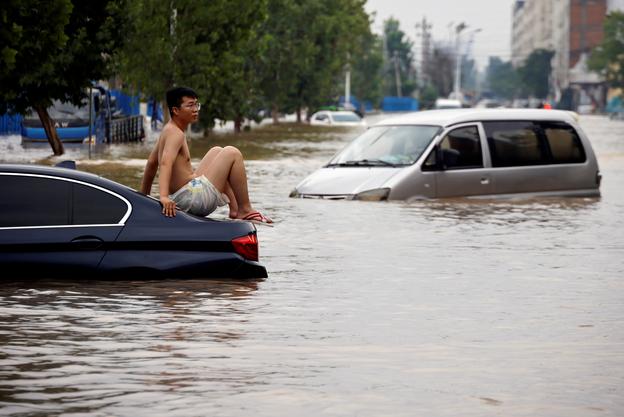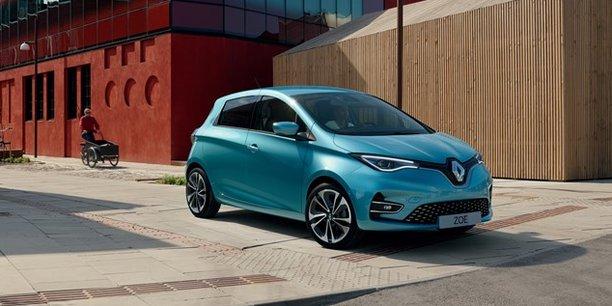Brice Lalonde: “Ecology should not be the monopoly of one party”
President of the Equilibre des Énergies association, the former former Minister of the Environment defends nuclear power, decarbonization and does not spare Europe Écologie-Les Verts.
Is the fight against global warming progressing?
It's finally starting to move, but it hasn't been easy. That being said, I have already experienced periods of euphoria, so I am suspicious… I particularly remember Obama saying that the climate inaction of the United States was over. Then we had Trump… With Biden, the situation changed. He actually appointed climate activists that I know to his administration. Another advantage of Biden: due to his age, he is not sure if he will run again, so he is in a hurry.
Conversely, there are grounds for concern. The world population continues to grow, developing countries need energy, coal producing countries continue to produce coal… Only developed countries have begun to reduce their emissions.
What are the main obstacles?
Energy sources are not evenly distributed across the planet. For two centuries, the world's prosperity has come from fossil fuels, which must now be abandoned. The equation is not that simple. It is made even more complex in France because some environmentalists are hostile to nuclear power. For them, you have to do without an ally.
What is the main lever to fight against global warming: individual actions or the transformation of the economic model of companies?
It is a question of politics and investment. Politics and business must work together. Consumers must also contribute to the effort. It is a shared effort. We need constraints, objectives and annual reports. There is no single solution, it is a combination. The ecological look must be global. We must stop brandishing perfect and magic solutions.
Is the transformation of our lifestyles fast enough in view of the alarmist assessments of the IPCC (Intergovernmental Panel on Climate Change)?
She's not going fast enough. Except in one area: the automobile. The European Union has taken tough measures, contrary to what it does in construction or industry. Most major car companies are going electric. But this revolution will require a lot of effort from manufacturers, public authorities and motorists.
Can France play a role in this new environmental situation?
We have nuclear power stations that other European countries do not have or do not want. This gives us crucial strategic independence. To fight against climate change, we must first electrify, because electricity can be produced (wind, solar, hydraulic) without emitting greenhouse gases. But still it is necessary to agree to electrify, which is the case for cars, but not yet for buildings. There is very strong resistance from the powerful gas lobby. As for the industry, it has gone to China. She should already come back. When we look at France's carbon footprint, we see that the emissions due to our imports are higher than the emissions produced on our territory.
Is the action of lobbies the main obstacle?
The gas and oil lobby, in particular. The revenues of the most powerful companies and producing countries, such as Saudi Arabia or Russia, come largely from the sale of fossil fuel. It is obvious that they do not want the transformation to accelerate. The oil companies are even saying that if they can no longer sell oil, they will sell plastic…
But the big oil companies are also converting. Look at Total, which is today the second largest producer of solar electricity in the world. In the United States, ExxonMobil, the main financier of anti-climate propaganda, has just been outvoted by shareholders campaigning for decarbonization. It's a revolution.
When you were at the Ministry of the Environment, were you confronted with the influence of lobbies?
Of course. When I had to impose catalytic converters and unleaded gasoline, I had to resist the car companies. But lobbying isn't necessarily a bad thing, it's part of the job. Anti-nuclear activists also form a lobby. Everyone defends their cause.
Unlike most environmentalists who remain firmly opposed to nuclear power, you claim that it is an "ally" in the fight against global warming...
Nuclear is not the problem. It is an energy that does not generate greenhouse gases. As long as we can have electricity of nuclear origin, it is better to keep it.
Some defend a total exit from nuclear power. What does this perspective inspire in you?
It would be a mistake. Shutting down Fessenheim (the Fessenheim power plant, in the Haut-Rhin, was shut down in June 2020, editor's note) was a major mistake. It is an inconceivable decision. We wonder if those responsible had their heads in the right place… We may not like nuclear power, but the real subject is how we fight climate change.
The government is committed to reducing the share of nuclear power to 50% by 2035. How do you view this decision?
It's not coherent, it's a wet finger. This decision is based on the idea that we will consume less and less energy and that we will all be extremely sober. Which is an aberration. On the contrary, when we look at the challenges of decarbonization, we will undoubtedly need more energy.
Why ?
Because you can't fly airplanes on synthetic fuels if you don't have the energy to produce them. Likewise, you're not going to be able to produce hydrogen if you don't have electricity to electrolyze water. Decarbonization is very expensive in terms of energy. The future will not be more frugal. We will need even more carbon-free energy. A large part of the projections are based on a vision of the 70s, at the time of the Yom Kippur War, energy savings and the slogan "we don't have oil, but we have ideas"... All this is outmoded. Yields and energy savings are not the issue. What matters is to reduce CO2 emissions. Decarbonization is the key.
The Négawatt association envisages France using 100% renewable energy in 2050. What does this scenario inspire in you?
They don't know the climate. Their scenario is off the mark, because the problem is CO2 emissions. They remind me of firefighters who, instead of fighting the fire with fire hoses, would only care about the size of the hoses to save water…
Wind power is increasingly decried. Do you share the arguments of its detractors?
There is no downside-free source of energy. Wind turbines have their drawbacks, just like nuclear power plants, solar panels... The privileged place of wind turbines is where there are trade winds (wind from the intertropical regions, editor's note). In France, we have ribs. Floating wind turbines are less troublesome. But if we want to replace power plants with wind turbines, we will need a lot of wind turbines.

How to Make Matcha Green Tea Chocolate Chip Cookies https://t.co/fyxnqVW9uc
— Matcha By Mark Mon May 21 16:00:35 +0000 2018
What about the Scandinavian countries which massively use wind power?
It's normal, they are charcoal. In Scandinavian countries, installing wind turbines is interesting. When you have nuclear, it's much less useful.
In the fight against global warming, the question of social justice is rarely mentioned. How do you apprehend it?
We must take this into account and help citizens who do not have the means to transform their mode of heating or transport. Redistribution is needed. Everyone has to make an effort. When you introduce an energy tax, you have to redistribute that money to those who need it. But beware of cliches. People who live in the countryside, for example, often have electric cars because it is easier to charge their vehicle in a garden.
Is the end of diesel good news?
We made a mistake by wanting to transform the diesel immediately. In the countryside, diesel emits less CO2 than gasoline. In town, on the other hand, diesel is more harmful, including for the lungs. Stopping diesel is a decision that the city imposes on the countryside.
Is environmental policy therefore too Manichean?
Absolutely. These are systematic decisions. We make a decision and we impose it on everyone in an undifferentiated way, whereas it would take measures on a case-by-case basis, even if it is more complicated to implement.
Multinationals have a heavy responsibility for greenhouse gas emissions. Should we force them to transform?
We necessarily need constraints, but we also need to discuss and sign international agreements. We agree on a certain number of objectives and we try to apply them. Multinationals are not the devil. They are already changing. It's more complicated for companies that sell coal or oil, because you're attacking their business model directly.
Are multinationals the problem or the solution?
When you want short-term profit and you don't care at all about the environmental or social consequences of the activity in which you are a shareholder, that does not contribute to solving the climate problem, I grant you that. But not all business leaders are criminals! They are normal people who also think about the future. The emergence of CSR and companies with a mission is proof that a transformation of companies towards the common good is underway. We will not achieve anything without companies. This is what differentiates me from the Greens in particular: they have an anti-business rhetoric. For my part, I think that companies are allies in the fight against climate change. Without them, the fight is lost in advance.
What do you think of punitive ecology?
There is punitive ecology and incentive ecology. You probably need a bit of both… But we shouldn't punish everyone. We must punish the delinquents, those who pollute with impunity. The Greens are very keen on punitive ecology. Their credo is simple: "just ban, just delete"... The reality is not so caricatural. There are social problems, support measures to be put in place, substitutions to be made...
How do you judge the direction taken by Europe Écologie-Les Verts?
Its evolution does not make me extremely happy. I think they do too much politics and not enough ecology. They should work more. They have the color green and think that it exempts them from making efforts. Why ? Because they believe that people who care about ecology will automatically vote for them...
Basically, they are mainly concerned with preparing for the next election by signing agreements to place themselves in municipal and regional councils or in government. In short, they seek to seize power. Ecology should not be the monopoly of one party, it is a public issue that concerns all political parties.
On what points are the Greens going wrong?
in the nuclear field. They also want to remove the electric heating. On the question of relations with political Islamism, they are also on the wrong track. They don't see the threat.
You are very critical of the Greens. But if the climate issue has become central, isn't it partly thanks to them?
Is it really thanks to them? Or is it youth, associations or simply the force of things? The youth demonstrations were not organized by the Greens. The Greens are part of a great movement, but they are not leading it.
Do you blame them for being too close to the left?
Absolutely. They shouldn't be left of the left. It's a positioning error.
Is ecology left or right?
Ecology is everyone's business. The defense of nature is neither right nor left. In the 1960s, environmentalists were nicknamed “conservationists”. The WWF was created by Prince Bernhard of the Netherlands and the Duke of Edinburgh. It's not really the radical left!
Is capitalism responsible for the climate crisis?
What is capitalism? We often use this word to describe today's reality, without really knowing what it means… It is obviously human activities that are at the origin of global warming. But did capitalism create fossil fuels? In part, yes. But let's not forget that the biggest oil companies are public companies.
Of course, capitalism must be regulated. There is no market without regulation. We need laws and rules. And if possible international laws, because the climate issue is global. One of our difficulties is precisely the absence of regulation or planetary governance in the face of a planetary problem. The United Nations is just a union of sovereign states. Only Europe legislates a little at the supranational level.



